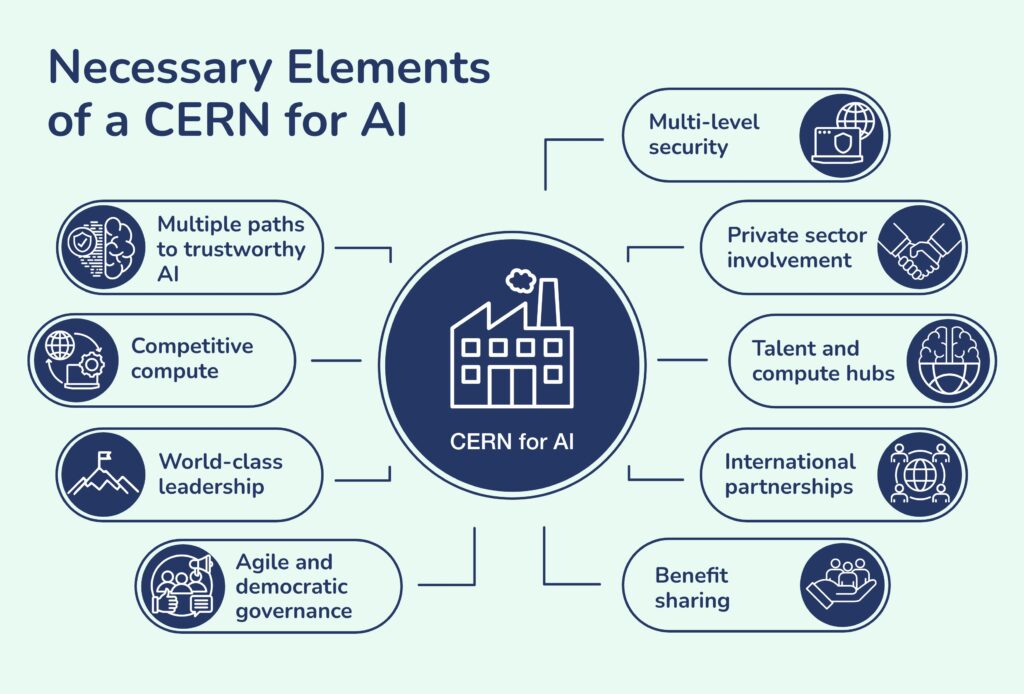Brussels, Belgium – 2024/09/04. A new report from the International Center for Future Generations (ICFG) puts forward a detailed breakdown of how one of the incoming European Commission’s most important policy proposals can become a success.
“CERN for AI should be understood not just as an ambitious tech project, but a crucial step to secure Europe’s economic future, safeguard its security and geopolitical standing, and steer the trajectory of AI development towards more trustworthy and ethically aligned systems,” said Max Reddel, ICFG’s Advanced AI Director.
In her political guidelines presented on July 18th 2024, European Commission President Ursula von der Leyen proposed a bold new initiative to create a “CERN for AI,” aiming to boost Europe’s competitiveness through AI innovation. This effort would pool resources across the continent, similar to the successful CERN model for physics research.
This initiative has been dubbed a “CERN for AI” and it would position Europe to compete with the US and China by developing large-scale AI models and infrastructure within the bloc. The goal is to enhance Europe’s economic performance, strengthen cybersecurity, and ensure strategic autonomy in the face of a potentially multi-trillion euro global market for AI. A pan-European AI effort could also support a thriving ecosystem of startups and scale-ups, benefiting both the private and public sectors.
Crucially, the initiative must prioritise creating safe and reliable AI, thereby addressing a critical scientific challenge and carving out a unique space in the current AI development paradigm. By establishing a CERN for AI, Europe could take the lead in developing trustworthy AI, moving beyond reliance on profit-driven companies largely based outside of the bloc.
“This might be the last chance for the EU to catch up on foreign advanced AI developers,” said Bálint Pataki, Senior Advanced AI Researcher at ICFG. “The US and China are committing large-scale public and private investments into the sector – without a dedicated effort, these nations will solidify their leads and the EU will once again primarily be consumers rather than producers of this innovative industry.”
Nine Key Features for Success
Right now, the CERN for AI idea still only exists as a high level proposal. ICFG’s new report drills down into the details to put meat on the bone of that proposal, concluding that there are nine key features that will set this new institution up for success.
- Multiple paths to trustworthy AI: Make solving the scientific problem of trustworthy AI its core mission, and tackle it through multiple, targeted, research bets;
- Competitive compute: Be allocated a budget of €35 billion over three years to ensure access to competitive computational infrastructure.
- World-class leadership: Appoint leadership that can quickly attract top talent and hit the ground running;
- Agile and democratic governance: Balance decisiveness and oversight in the governance structure;
- Multi-level security: Strive for openness and transparency where responsible, and security where necessary;
- Private sector involvement: Enable the private sector to build upon public, foundational research, and accept their co-funding after rigorous screening;
- Talent and compute hubs: Create a single, dedicated talent hub, accompanied by 1-5 separate compute hubs;
- International partnerships: Remain open to partnerships with like-minded non-EU countries; and
- Benefit sharing: Ensure a benefit-sharing structure among participating governments and businesses.
 Europe’s economy missed out on several tech-driven booms over the past 30 years. McKinsey analysis suggests that this is a critical factor in the bloc’s lagging economic performance. The deterioration of the EU’s GDP compared to the US and China coincided with the development of critical and high-value technologies such as compute infrastructure and web-based enterprises.
Europe’s economy missed out on several tech-driven booms over the past 30 years. McKinsey analysis suggests that this is a critical factor in the bloc’s lagging economic performance. The deterioration of the EU’s GDP compared to the US and China coincided with the development of critical and high-value technologies such as compute infrastructure and web-based enterprises.
Further design choices remain that could help CERN AI to become a success for the EU. In a follow-up publication, ICFG will explore what legal entity and founding process may best suit the institute, where exactly its funding could come from, what its governance structure could look like, what kind of benefit-sharing arrangements such an institute could have, and further relevant design questions.
For more information, please contact:
Rowan Emslie: Chief Communications Officer
r.emslie@icfg.eu // +32 476 97 36 42
About ICFG
The International Center for Future Generations (ICFG) is an independent think-and-do tank dedicated to shaping a future where decision-makers anticipate and responsibly govern the societal impacts of rapid technological change, ensuring that emerging technologies are harnessed to serve the best interests of humanity.
Our experts supply rigorous, independent, policy-oriented research and analysis that connects the dots between the frontiers of emerging technology development and the principles of good governance. Learn more here.
